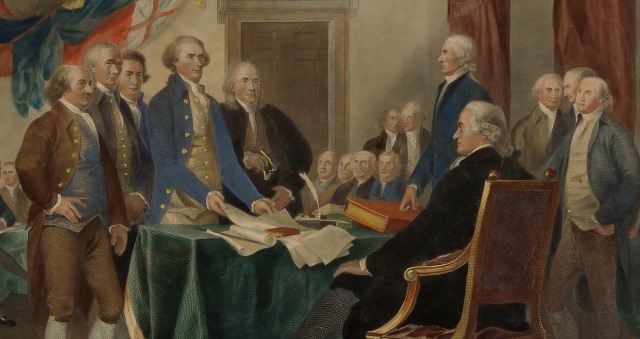What if we declared July 4th Interdependence Day?
You think you know how our founding declaration begins? “When in the course of human events…” Turns out, that’s not strictly true.
The original document, housed now in pride of place at the National Archives, begins like this: “The unanimous Declaration of the thirteen united States of America…” After that comes the part you memorized in school.
Before independence could be declared, a unanimous recognition of the interdependence was invoked. Unanimity that was not without its controversy, of course. At the time the Declaration of Independence was signed Benjamin Franklin was supposed to have said “We must all hang together, or, most assuredly, we shall all hang separately.”
Newer historical research examines our nation’s founding from the perspective of the slave trade. It sheds new light on the motives and motivations of the 13 colonies that bears reflection.
An uncomfortable truth
The Declaration of Independence didn’t recognize enslaved people or Native American Indians as human beings. At this new moment in our nation’s story, it is time to acknowledge this deeply painful truth: This experiment in democracy “of the people, by the people and for the people” was built not only on noble thought and democratic ideals, but also on the genocide of the indigenous people of this land, and the enslavement of forced immigrant laborers.
This is an uncomfortable truth. Please don’t let this dampen your holiday plans. Allow it to deepen and widen them! Is it not past time for a mature and truthful recognition of the foundations of this nation? As you observe this Independence Day holiday, a few moments’ reflection on the interdependence that lies at its foundation may be in order.
Ways to observe the holiday
Read the entire declaration of independence.
Learn about Crispus Attucks, the indigenous man who was among the first to die in the war for independence.
Reflect on the role of slavery as a reason for revolution.
Then, with this re-contextualization, reflect on the final sentence of the Declaration of Independence. “And for the support of this Declaration, with a firm reliance on the protection of divine Providence, we mutually pledge to each other our Lives, our Fortunes and our sacred Honor.” Whose lives? Whose fortunes? Whose honor?
Moving forward
To paraphrase St. Paul, now is a very acceptable time to seek to tell a more truthful story about our national origins. Then, perhaps, we can move forward with integrity, seeking equity for all our people. But how do we do that?
In 2016, the Jesuits at Georgetown University launched their Slavery, Memory, and Reconciliation Project. Based on their admission that they enslaved hundreds of people in colonial Maryland and sold many of them into slavery in Louisiana to finance the construction of the university, they are in the process of investigating their history and making reparations to the descendants of the people they enslaved. Browsing their slave archives and the history of their journey may provide a new imagination for our forward movement as a nation.
Celebrate. Learn. Mourn. Move forward together.
A blessed Interdependence Day to you.


